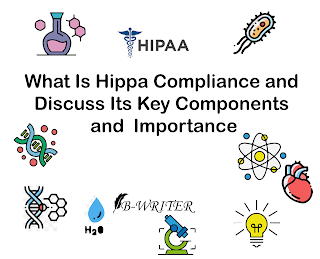Understanding HIPAA Compliance: Safeguarding Patient Privacy and Health Data
In the realm of healthcare, the acronym "HIPAA" stands as a sentinel guarding the sensitive information of patients and the integrity of healthcare institutions. HIPAA, or the Health Insurance Portability and Accountability Act, is a critical piece of legislation enacted in 1996 to address the growing concern over the privacy and security of personal health information. In this article, we delve into the essence of HIPAA compliance, exploring its purpose, key components, and the importance of adhering to its guidelines.
What is HIPAA Compliance?
HIPAA compliance refers to the adherence to the rules and regulations set forth by the Health Insurance Portability and Accountability Act. The primary goal of HIPAA is to ensure the privacy, security, and confidentiality of individuals' protected health information (PHI) while facilitating the smooth flow of healthcare information. PHI includes any data that can be linked to an individual's health, medical history, or healthcare services.
Key Components of HIPAA Compliance:
- Privacy Rule: The HIPAA Privacy Rule establishes national standards for the protection of PHI. It grants patients the right to control the use and disclosure of their health information and sets limits on who can access this data. Healthcare providers and organizations must obtain patient consent and provide individuals with a notice of privacy practices.
- Security Rule: The Security Rule complements the Privacy Rule by outlining technical, administrative, and physical safeguards that healthcare entities must implement to protect PHI. This includes measures such as encryption, access controls, and regular risk assessments.
- Breach Notification Rule: HIPAA mandates that healthcare organizations report breaches of PHI to affected individuals and relevant authorities. Timely and transparent communication about data breaches is crucial in maintaining trust and mitigating potential harm.
- Enforcement Rule: The Enforcement Rule empowers the Department of Health and Human Services (HHS) to enforce HIPAA regulations. Non-compliance can result in significant fines and penalties, making it imperative for healthcare entities to take HIPAA seriously.
- HIPAA Transactions and Code Sets Rule: This rule standardizes electronic healthcare transactions, ensuring that healthcare data is transmitted uniformly across the industry. It simplifies administrative processes and reduces the risk of errors.
Why is HIPAA Compliance Important?
- Protection of Patient Privacy: HIPAA safeguards the confidentiality of patient information, fostering trust between patients and healthcare providers. Patients are more likely to share sensitive information when they know it is being protected.
- Security Against Data Breaches: Compliance with HIPAA's security measures helps prevent data breaches that can lead to identity theft, fraud, and reputational damage for healthcare organizations.
- Legal Obligation: Failure to comply with HIPAA can result in severe legal consequences, including fines and criminal charges. Compliance is not optional but a legal requirement.
- Enhanced Data Integrity: Standardized transactions and code sets improve the accuracy and reliability of healthcare data, reducing errors and improving patient care.
- Interoperability: HIPAA's standardized approach to data exchange promotes interoperability between healthcare systems, enabling better coordination of care.











0 মন্তব্যসমূহ